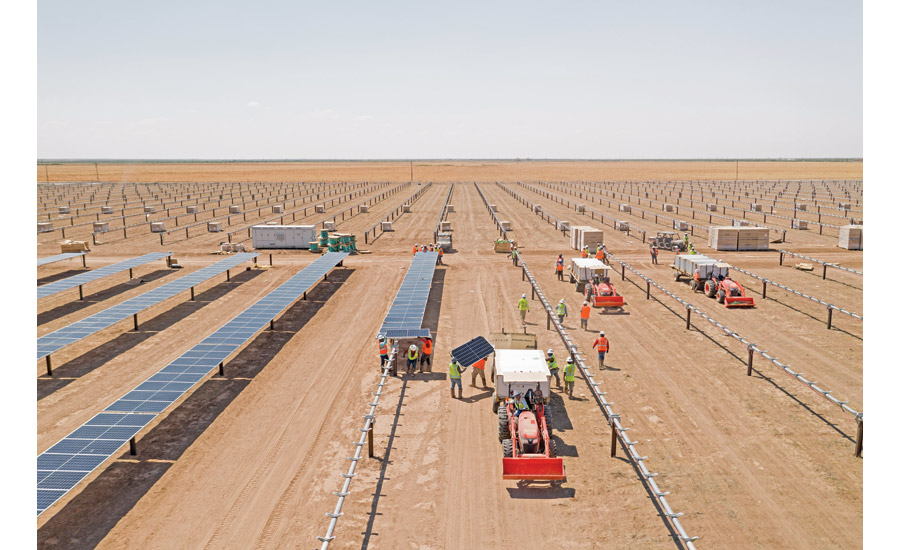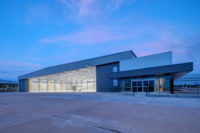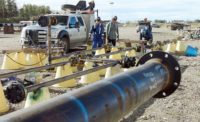Swinerton’s 25th anniversary in the Texas construction market last year easily could have been tarnished by the upheaval of the coronavirus pandemic. Though the company certainly wasn’t immune to 2020’s challenges, it did manage to power through the difficulties, literally and figuratively, thanks to a healthy backlog that included a strong presence in several active sectors, including commercial development, technology and the state’s booming renewable energy market.
Swinerton’s nearly $647 million in 2020 regional revenue was driven by commercial growth associated with continued corporate relocations to Austin and Dallas, home to Swinerton’s Texas headquarters and two-year-old branch office, respectively. Projects in the state capital include the build-out of Domain 10, a $48-million, 15-story, Class A, podium-style office building, and Center Lake 02, a $28-million, 130,000-sq-ft design-build tenant improvement project. Dallas-area projects include a 36,740-sq-ft tenant improvement project for Qualtrics in West Plano and a 38,750-sq-ft hangar project at Dallas Love Field.
“Some things paused while COVID-19 protocols were figured out, but our backlog helped us go right through it,” says Tim Kretzschmar, Swinerton senior vice president who serves as the company’s central region manager. “We did see some 2021 and 2022 starts push back a little bit, but they’re starting to bounce back. And, development is getting bullish.”

Swinerton completed the Dallas office’s first ground-up project this year, a 38,750-sq-ft hangar facility complete with office and shop space in the southeast corner of Dallas Love Field.
Photo by Chad M. Davis
Swinerton CEO Eric Foster adds that the company’s extensive self-perform resources often gave the company greater control over project scheduling amid pandemic-related labor and supply disruptions, particularly for technology projects where speed to market is critical.
For example, Foster says Swinerton’s ability to prefabricate and ship everything from door hardware to drywall partitions from company facilities in California “was a big help for maintaining control over the pace of the project, and ensuring quality.”
These same capabilities also helped Swinerton Renewable Energy (SRE), Swinerton’s San Diego-based energy specialty arm, do its part to keep Texas on track to surpass California in utility-scale solar energy capacity. Last year, SRE completed four projects in the state totaling 1 gigawatt of installed capacity. Other projects currently underway will help triple that figure over the next two years.
George Hershman, SRE president, notes that the expansive nature of solar projects, usually spread across 1,000 acres or more, also helped ease adjustment to the COVID-19 world. So too did the projects’ intense, relatively short-term labor requirements. The outdoor, socially distanced nature of eight- to 10-month-long photovoltaic projects were highly attractive to pandemic-displaced service and petroleum workers.
“We actually saw our project productivity levels grow,” Hershman says.
Swinerton was also able to tap 3D collaboration technology to keep out-of-town clients engaged with their projects when the pandemic grounded all but the most essential travel. Kretzschmar describes how these tools helped one confidential Pacific Northwest-based technology client join in real-time punch list walks and inspections.
“That ability to make on-the-fly changes and figure out alternatives shows what we can do as a company,” he says.

The HiFi is a high-end entertainment venue in downtown Dallas. Swinerton completed the adaptive reuse of a 35-year-old industrial building totaling 23,000 sq ft across two levels.
Photo courtesy of Live Nation
New Ideas for a Changing Market
Foster credits such situational nimbleness to a corporate culture that mirrors the social responsibility priorities of its clients. He cites initiatives in sustainable operations to reduce both the company’s overall carbon footprint and onsite construction waste.
Swinerton’s newest effort, Timberlab, aims to tap its experience in mass timber construction to help accelerate adoption of the renewable building material in the mainstream construction market. Debuting earlier this year, the Portland, Ore.-based Swinerton affiliate company will deliver the full life cycle of a mass timber project, including inception, engineering, fabrication and installation.
Kretzschmar says the increasing presence of environment-conscious technology companies in Texas bodes well for future applications of mass timber. Swinerton is already providing preconstruction services for a proposed school project in Dallas that could further raise the material’s profile in the area.

Swinerton craft employees self-performed framing, drywall, concrete work, ceiling systems, toilet accessories and specialties at a confidential tenant improvement project in Austin.
Photo by Jonathan Garza
“As carbon taxes begin to affect conventional building materials, the price of mass timber will line up favorably with concrete and steel,” he says.
Swinerton is also exploring ways technology can help address the increasing scarcity of craft labor.
They include collaborations with robotics firms to automate floor layouts and drywall finishing.
“The results so far are very promising, from both productivity and quality standpoints,” Foster says.
Though advancements in robotics and other construction technologies promise to boost site productivity, construction remains very much a relationship-oriented business.
“Swinerton has some of the best project managers and superintendents who provide exceptionally proactive planning and leadership on their projects,” says CJ MacQuarrie, vice president of development for Cousins Properties, which has worked with Swinerton on several Austin-area projects since 2018. “They can traverse problems with multiple solutions and maintain schedules amid hardships or project setbacks.”
That commitment was particularly important to Jody Edward Ginn, executive director for the Former Texas Rangers Foundation, which has been working with Swinerton on preconstruction for Phase 2 of the Texas Rangers Heritage Center in Fredericksburg. Ginn explains that 2020 was particularly difficult for nonprofits, with the coronavirus-slowed economy curbing donations and straining already limited budgets.

At 379 MWdc, the Prospero solar project in Andrews, Texas, is Swinerton Renewable Energy’s largest installation to date.
Photo by Brian Doll
“Swinerton might’ve easily walked away from the project, but they’ve never wavered,” he says, adding that the company is using its alternative financing and project delivery expertise to develop financial documents and presentations for prospective lenders, with an eye toward beginning construction next year.
“The process is actually enjoyable, which is particularly important since my background isn’t in construction,” Ginn says.
And while Swinerton has only just started on a 100,000-sq-ft office building for Peloton Inc.’s Plano campus, the contractor has already made a strong impression with its people and practices.
“They’re a very process-driven organization, something they use very well,” explains Steve Harvey, Peloton’s senior director of construction. “They’ve helped us pre-identify problems and provide solutions that have helped us get out in front of procurement and other issues. And they keep me involved. I feel more like a team member rather than a client.”

Members of the Swinerton Renewable Energy team on site at the Taygete solar project in Pecos County, Texas.
Photo by Brian Doll
Building for the Next Decade
To sustain that momentum amid the increasing scarcity of both management and craft resources, Swinerton has invested more resources over the past years to bolster its training and recruiting efforts.
Hershman notes that last year’s heightened awareness of social justice inspired a deliberate effort to increase the diversity of Swinerton’s internship program. This year’s 110-member class represents more than 20 universities, including historically Black schools such as Howard University and North Carolina A&T.
“It’s our most diverse group ever, and we look forward to broadening it even further,” Hershman says.
Cultivating that talent will be critical, adds Foster, as a tenet of Swinerton’s 2030 vision plan is to expand its nationwide presence. “Texas is one of the markets we’ve targeted to achieve that goal,” he says.
Sectors Swinerton sees as particularly promising range from aviation to health care and life sciences. Kretzschmar notes that industrial and manufacturing projects are also starting to emerge in parts of the state.
“We’re seeing a lot of project opportunities and figuring out how we will pursue them while also trying to address the shortage of craft labor,” he says, adding that the value of a varied portfolio may well be one of the biggest lessons learned from the pandemic.
“We want to be as diverse as we can be and serve as many markets as we can,” he says.




